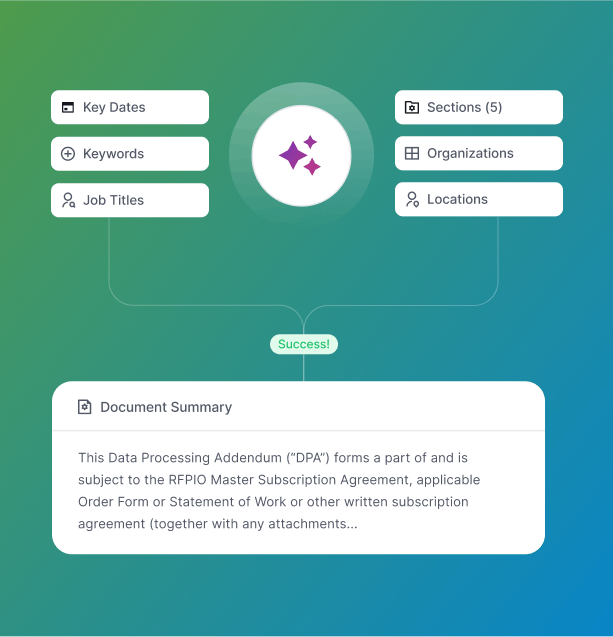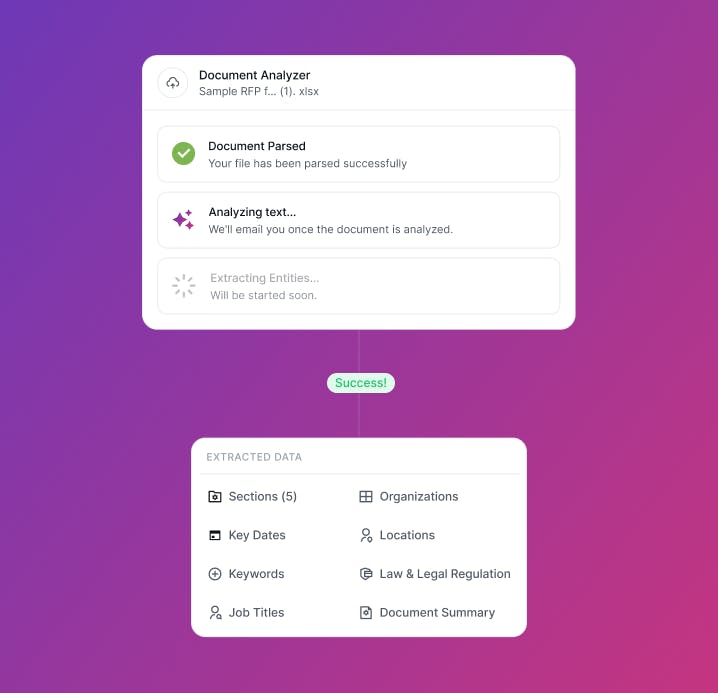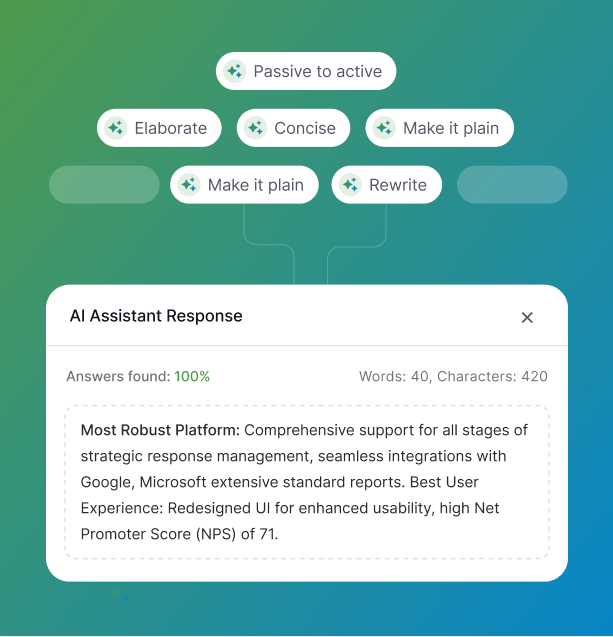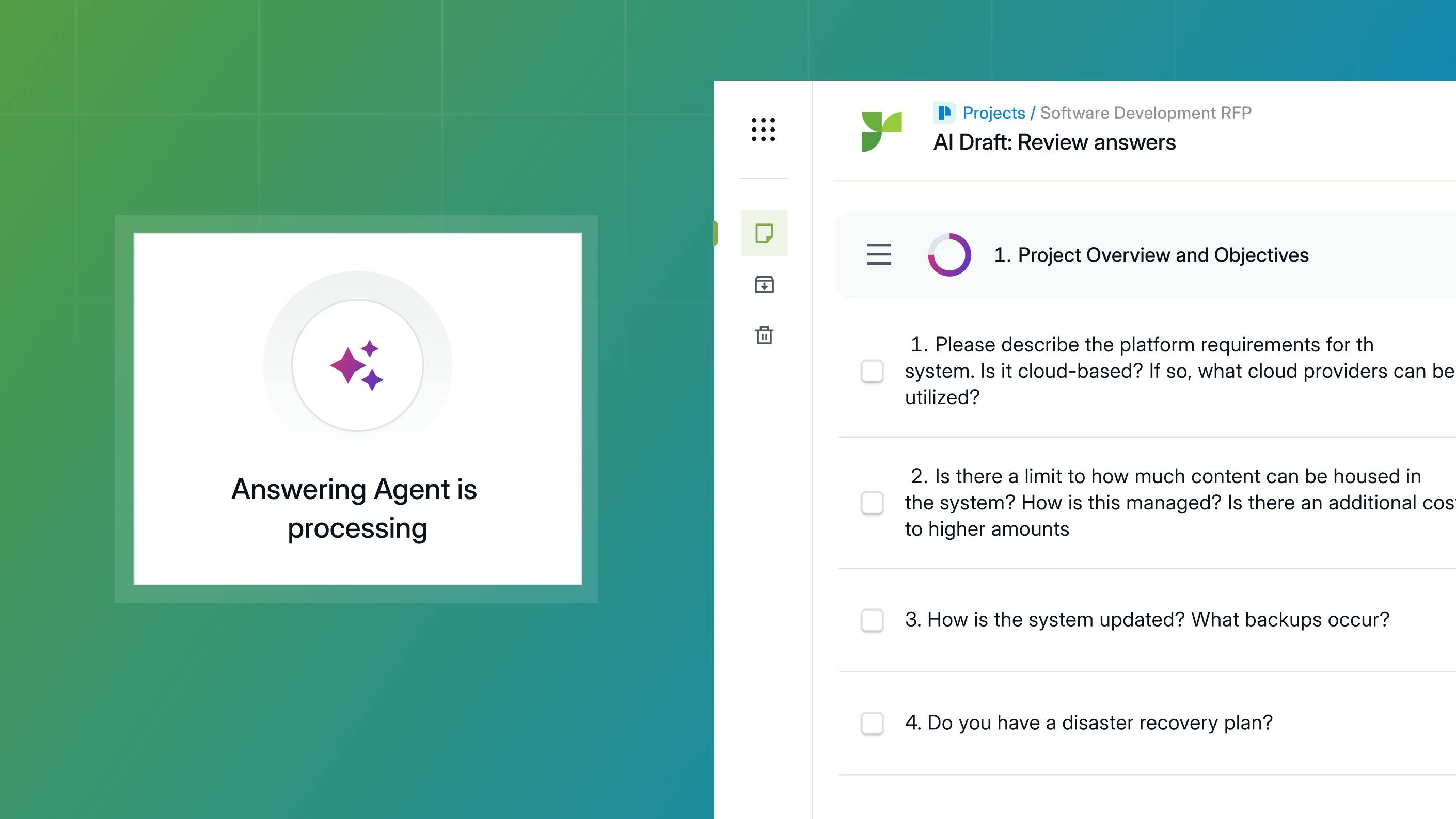You rely on proposal writing software more than ever — but expectations are shifting. You need tools that do more than streamline workflows. You’re seeking intelligent systems that adapt to your team, offer instant access to institutional knowledge, and anticipate needs before you even ask.
This post outlines how proposal software is quickly moving beyond traditional SaaS into AI agent-led solutions. We’ll explore the software limitations that are prompting change, what AI agents actually do, how they work with SaaS, and what it means for your future proposal writing. Finally, we’ll take a closer look at Responsive’s Agent Studio, a leading example of this evolution.
The evolution of proposal writing: From SaaS to AI

Most proposal tools used today are best described as enhanced SaaS platforms. These solutions provide value by offering centralized content libraries, collaborative response workflows, compliance tracking, and basic automation features. They’re helpful in organizing RFPs, improving collaboration, and reducing repetitive tasks.
However, growing demands are pushing the limits of these platforms. RFPs have become much more detailed and complex, often requiring input from multiple stakeholders across departments. On top of that, buyers expect a level of personalization that goes beyond the plug-and-play responses these platforms provide. Sales cycles are more compressed too so you’re also under pressure to deliver these high-quality, tailored responses quickly.
According to Forrester research, modern B2B buyers expect vendors to respond faster and with greater precision, making agility a critical differentiator in competitive markets.
The limitations of SaaS for proposal writing
While SaaS platforms improve basic workflows, they are still rooted in rigid, predefined structures. You often have to adapt your work to fit the tool, not the other way around. Common limitations include hard-coded processes that are difficult to tailor to your changing needs, and application-centric designs that require switching between modules for different functions. This creates friction and slows down your proposal development.
Another drawback is functional silos. Content management, collaboration, and analytics often operate in separate spaces within the same platform. This slows your response times and makes it harder to surface insights when you need them. These inefficiencies can lead to missed opportunities, reducing the value SaaS platforms provide at scale.
What are AI agents?
AI agents are autonomous systems designed to perform specific tasks with minimal input from you. In proposal software, these agents help you complete tasks like drafting responses, suggesting content, identifying compliance gaps, and summarizing buyer requirements. They use structured data, historical content, and team preferences to operate in a way that adapts to your needs.
At Responsive, we built our AI agents as purpose-driven assistants that act on your behalf. They aren't just rules-based bots — they're powered by advanced AI models capable of learning your patterns and surfacing contextually relevant actions. For example, an agent might flag inconsistencies between your draft and the buyer’s RFP, recommend approved language, or pre-fill response fields using my recent proposal history.
How AI agents are driving the future of proposal technology

The shift toward AI agents represents more than an upgrade — it’s a change in how you write proposals. These agents don’t just automate tasks; they interpret your context and execute with precision. That includes generating draft content that matches your buyer’s tone, surfacing relevant responses based on proposal type, and coordinating with your collaborators in real time.
AI agents extend beyond basic automation to offer decision support. They identify trends in your proposal wins, flag gaps in your content coverage, and provide insights that help you refine your strategy. By combining real-time analysis with responsive actions, agents reduce delays and help you elevate the quality of every proposal you submit.
Defining the future of proposal writing
What will tomorrow’s proposal technology look like? The most forward-looking solutions share four key characteristics, all of which point toward greater adaptability and relevance for your team. These characteristics are already being built into leading tools:
Interactive workflows
Instead of forcing you to follow rigid sequences, interactive workflows adapt to how you actually work. AI agents help personalize your experience by prompting your next best action or highlighting potential blockers. For example, when a legal review is needed, your software can route the section automatically based on your team’s past assignments.
These workflows respond to your behavior, not the other way around. That means fewer bottlenecks and smoother progress from kickoff to submission.
On demand, anywhere
Your team doesn’t work in one place, and your proposal writing software shouldn’t either. AI agents make your content, past responses, and subject matter expert knowledge accessible wherever you are. You can surface the right content in a live meeting or flag a required approval mid-review without jumping between tools.
This flexibility is critical for distributed teams working across time zones. It also helps you reduce delays and speed up your review and approval cycles.
User-centric
Traditional SaaS asks you to adjust your workflow to fit the tool. AI-led systems flip that model. Instead of chasing down content or manually coordinating steps, your system orients itself around your behavior and preferences. That includes suggesting templates, flagging inconsistent language, or highlighting content that’s out of date.
By doing so, you can work faster and more confidently. Your proposal software becomes a partner, not just a container for tasks.
Digital specialists
AI agents act like specialists for every part of your proposal process. Instead of using general-purpose tools, you get dedicated support — an agent for formatting, another for compliance, another for knowledge management. Each one is tailored to its role and optimized for precision.
This also means the right insights reach the right person at the right time. Legal teams receive real-time flagging of risky language. Sales teams get buyer-specific insights. Proposal managers ensure that best practices are followed without having to manually enforce them.
How AI agents work with traditional SaaS
AI agents don’t replace your SaaS platform, they enhance it. By layering agents on top of your SaaS tools, you benefit from intelligence without losing the structure and reliability you rely on. The result is software that’s more adaptive and helpful without sacrificing control.
For example, Responsive’s Agent Studio integrates directly with your existing workflows, providing suggestions and support that match your team's processes. You don’t need to rebuild everything from scratch to benefit from AI — your current system simply becomes more powerful.
What to expect from AI-powered proposal writing

AI-led proposal tools are poised to become more anticipatory, adaptive, and role-aware. You can expect agents that not only respond to tasks but proactively surface opportunities. Think:
- Alerts when content is trending in losses
- Suggestions for which SME to involve
- Recommendations for language adjustments based on industry benchmarks
Over time, the goal isn’t just faster and better responses. Your software will help you answer not just more RFPs, but the right RFPs, with higher win rates and lower time investments. This is the shift that will define the next generation of proposal writing.
Explore the future of proposal writing today with Agent Studio
Responsive’s Agent Studio is already delivering the capabilities described above. With a library of AI agents built specifically for proposal teams, you’ll have access to content intelligence, draft generation, and workflow guidance all embedded within your existing processes. You don’t have to change how you work to benefit.
What sets Responsive apart is precision. Instead of offering generic automation, Agent Studio provides tailored support that helps you submit more compelling, compliant, and complete proposals.
Those wanting to learn more can start with this guide on how to choose AI for proposal management to make the right moves for your team.
